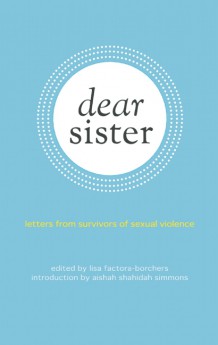Editor Q&A with Lisa Factora-Borchers of Dear Sister: Letters From Survivors of Sexual Violence
Available through AK Press in January 2014
Why did you decide to edit this book, and how do you feel it is contributing to the conversation and work around sexual violence?
Lisa Factora-Borchers: When I first worked as a legal and medical advocate for survivors of sexual violence, I often wished I had something to give them that very first night I met them after their assault. The packet they went home with was usually a plain folder filled with various tip sheets and hotline numbers. And when I walked them out of the hospital, I watched some of them collapse into a family member’s arms or I’d watch them step into a cab to take them home. It wasn’t those images that haunted me, but the feeling of aloneness they carried. I wanted to give them something more than that folder. That was the beginning of a very long road to begin an anthology for survivors.
I feel the conversation around sexual violence, particularly in the media, does very little for survivors themselves. Books about prevention are either written by academics or feminist authors about sexual prowess and empowerment. These can be powerful tools for deconstructing theories and strategies, but that doesn’t help the survivor in that very moment who holding the trauma in her body, reliving the violence because of the isolating nature of survivorhood. This anthology is multipurposed. It is first and foremost for survivors to know they are not alone. And it is also a tool for the communities survivors live in. Some of the pieces in the anthology lay down possibilities for helping survivors heal and also to address sexual violence at its core: in our own families, peer groups, professional settings, and neighborhoods. All of this is told by the survivors themselves. Who better to centralize in a discussion about sexual violence than the ones who have survived it?
Who are you trying to speak to with this collection? What does this book do differently than other books on the topic of sexual assault and abuse?
L: I’m speaking to the survivors of sexual violence and anyone who lives in community with them. (That means everyone.) Anthologies, in the literary world, are supposed to offer a compelling argument about a specific issue. Dear Sister makes a compelling argument by harmonizing different voices about justice, sexuality, and healing. It gives varying and different accounts of how one goes about their survival. There is no one path that works for everyone. This anthology highlights that diversity and speaks to the unpatterned and complex nature of everyday healing. It offers other survivors touchstones as they go through their own healing process. The survivors reflect upon the roles reproductive justice, immigration, healthcare, art, sexuality, poverty, race, and feminism have played in their lives as survivors. They give literary arms to other survivors.
The tagline of the book is “Surviving is testament to someone’s strength. Healing is testament to the community surrounding her.” I feel this perfectly sums up the duality of the book; an uplifting of the wisdom and bravery of survivors and the responsibilities of the communities in her healing process.
What was the most challenging aspect of putting together a book like this? What was the most rewarding?
L: The most challenging aspect was organizing over fifty contributors and editing a piece of literature that centralized on the most painful and unresolved part of their entire life. The anthology was completely organic in its inception. I learned a lot in this process because I never did anything like this before and there was no blueprint. I’d never seen anything like what I wanted to create and believing in something that was taking so long to finish was emotionally grueling. It tested every muscle of endurance.
Also absorbing all the stories – from the call from submission through the three years of editing the ones that ended up in the manuscript – took its toll on me as a human listener/reader. Though it is a book about hope, you can’t have hope without a nod to despair, and the weight of that despair could be crushing at times. I had to learn how to be an advocate again. To be balanced, to practice self-care. The last thing the world needs is another burned out person who meant well.
The most rewarding aspect of the process, by far, is when people contact me and write the book has helped them in their healing. When some of the contributors shared with me that writing their letter helped them talk to their mother again, or how putting their healing into words solidified a personal truth for them, there are no words to describe my joy. It is beyond rewarding. It is purpose.
What do you want readers to take away from this book? What are the essential lessons and narratives?
L: I want readers to take away a piece, no matter how small, that helps them understand the human condition. And the human condition is that we are not meant to be in isolation. Not in celebration, not in suffering, not in healing. We are meant to build and grow in communities and relationship with others. We are meant to learn how to love and converse with one another across differences, riches and struggles. To have each survivor close the book feeling a little bit lighter and less alone, to have the public consider how legislation, public policies, and social services impact survivors of sexual violence, to have family members and friends learn how rhetoric, love, and gentleness are radical tools for justice – this would be a great beginning for readers.

